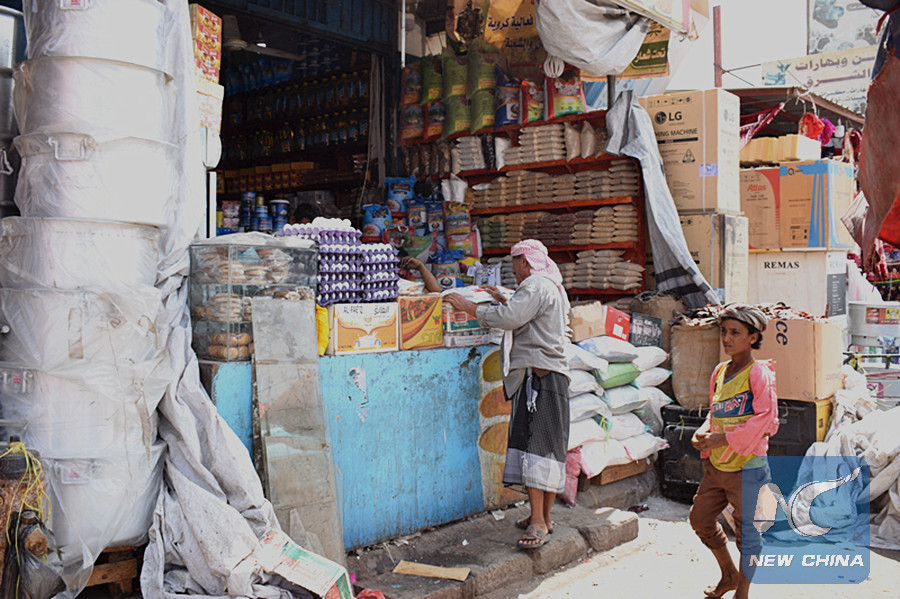
In the picture taken on March 19, 2018, business is slow at a grocery store in Aden, Yemen due to the recent sharp rise in food prices. (Xinhua/Murad Abdo)
ADEN, Yemen, March 20 (Xinhua) -- After three years of war and violence in Yemen, the recent soaring food prices are taking a further toll on the daily lives of many ordinary Yemeni families.
In the southern port city of Aden and five southern provinces controlled by the internationally-backed government, Yemenis have a relative sense of security despite sporadic terrorist attacks.
But on the economic side, the ordinary Yemeni families in the government-controlled provinces feel insecure, as the prices of basic needs soar month after month.
The skyrocketing food prices have forced a number of Yemeni families to practice food rationing by having only one meal per day.
The cost of several daily food items sharply increased during the past weeks, creating anger and fear among the residents.
"We are unable to afford the cost of sugar and rice imported from different countries particularly in this year," said Ahmed Gamal, an employee at the General Electronics Corporation in Aden.
"There are unknown reasons behind the incredible soaring prices of the food items in Aden these days," he added.
An owner of a supermarket told Xinhua that "the main reason behind the soaring prices is the higher costs in importing goods from foreign countries."
The owner said the suppliers raised their prices under the pretext of facing the depreciation and the continuing changes of the Yemeni currency.
He added that the suppliers of important commodities like rice and sugar are forced to buy U.S. dollars from the black market at higher exchange rate due to the recent foreign currency shortage in Yemen.
Some Yemenis blamed the Saudi-backed Yemeni government based in Aden for its weak supervision of the big merchants or importers to make sure that prices are decided according to the rules.
"Prices of food items are not similar in every store in the city and there is a huge difference between each one," said Saleh Saddam, a grocery owner in Aden's neighborhood of Mansourah.
"You can buy a sack of rice or flour at a specific price from this shop but you will find it with a different price elsewhere in the same neighborhood," he added.
Abdullah Ali, a marketing specialist based in Aden, told Xinhua that "the factors behind the price increase of basic commodities are all related to the recent political situation and the war taking place in the country."
"The economic situation of the country that is engulfed by a three-year of fighting is deteriorating day after day and it's normal that the prices of everything will be doubled," he said.
Meanwhile, thousands of commuters in Aden are complaining about the sharp rise of bus fares as a result of oil price hike in the city.
"Getting 20 liters of gasoline requires standing in a long queue in front of the gas station for about eight hours," said Hamdi Ridha, a bus driver in Aden.
"Sometimes we engage in quarrels with passengers who refuse to pay high fares and we feel helpless. We are all victims," the bus driver added.
An increasing number of students gave up going to high schools and others quitted universities because of high public transportation fares in Aden and neighboring provinces.
"Going to university campus and coming back to your home is a bit difficult nowadays," said Tamim Shmasan, a student at Aden's Faculty of Education.
"Some of my smart colleagues don't attend the lectures anymore because their families can't afford the bus fares. Other students left the faculty to search for work instead of studying," he said.
Yemen's government, allied with the Saudi Arabia-led Arab military coalition, has for about three years been battling the Iranian-backed Shiite Houthi rebels over control of the country.
The coalition began a military campaign with airstrikes in March 2015 to roll back Houthis' gains, in a bid to reinstate Yemen's exiled President Abd-Rabbu Mansour Hadi and his government.
The coalition also imposed an air and sea blockade to prevent weapons from reaching Houthis, who seized the capital Sanaa and most of the northern Yemeni provinces.
UN statistics show more than 10,000 people, most of them civilians, have been killed since the coalition intervened in the Yemeni civil war that have also displaced around 3 million others.

